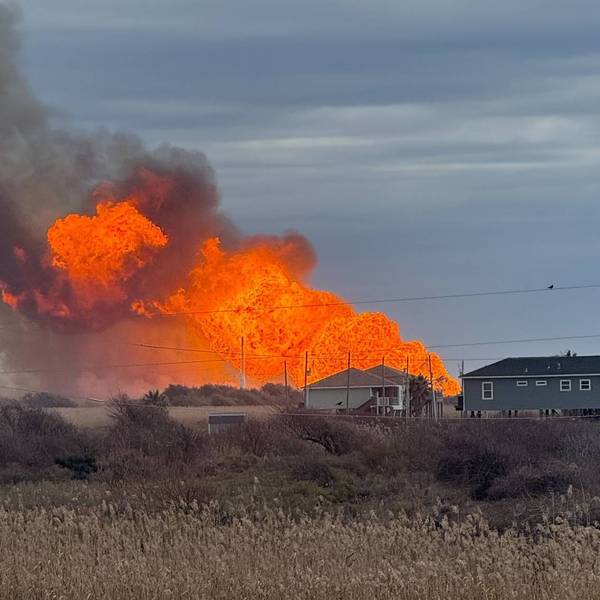Fire and smoke erupted for a second time Friday evening at the Houston-area Arkema chemical plant, but what exactly is going up in flames appears to remain a mystery to the public still reeling from a trail of devastation left by Hurricane Harvey.
The company said in a statement that the new fire at the Crosby, Texas plant was the
result of extremely high water and power loss at our site in the wake of Hurricane Harvey. The resulting loss of redundant refrigeration systems created concerns for some of our organic peroxides products, which can burn if not stored at low temperature.
Twitter user and news photographer Richard Guerra posted this showing the fire and black plumes of smoke:
A 1.5 mile evacuation zone remains around the perimeter of the plant, which local KHOU11 found, had 10 serious violations in an OSHA report from last year, nine of which regarded safety management of highly-hazardous chemicals.
As Common Dreams wrote, a fire already broke out at the plant on Thursday. As the company then warned, it said Friday that more explosions are likely on the way with six remaining chemical storage trailers still at risk as refrigeration systems are still damaged.
From the Associated Press:
The height and color of the flames from the plant Friday suggested incomplete combustion of the organic peroxides, Texas A&M chemical safety expert Sam Mannan said. With complete combustion, he said, the byproduct is carbon dioxide and water, posing about the same amount of risk as standing too close to a campfire. But incomplete combustion implies something else is burning.
The Houston Chronicle reported Friday that Arkema
is refusing to provide a chemical inventory and facility map to the public, one day after promising to provide the information.
Speaking to reporters this morning, Arkema CEO Richard Rowe said the company was balancing "the public's right to know and the public's right to be secure."
As International Business Times reported Friday, "Under both federal and state law, the firms can elect to disclose such information, or not to."
The Texas Commission on Environmental Quality (TCEQ) has the company's so-called Tier II report, which contains the detained chemical information. But while they are technically public documents, "current laws and policies make them incredibly difficult to access," the Texas Tribune reported, noting that
to see a risk management plan, for example, you must set up an appointment at one of only a handful of federal reading rooms, a process that proves onerous or impossible even for experts and lawyers. By law, companies must provide Tier-II inventories within 10 days of a formal request--a long wait in an emergency scenario--and it's not clear whether any government agency penalizes companies who refuse.
In addition, IBT reported,
Less than four months ago, Arkema pressed the EPA to repeal the chemical plant safety rule, criticizing the rule's provisions that require chemical companies to disclose more information to the public. In a May 15, 2017 letter to the EPA, Arkema's legislative affairs director wrote that "new mandates that require the release to the public of facility-specific chemical information may create new security concerns if there are not sufficient safeguards to ensure that those requesting the information have a legitimate need for the information for the purposes of community emergency preparedness."
A month after that letter, the EPA said it was pushing back implementation of that rule to 2019.
That was a decision, noted Genna Reed at the Union of Concerned Scientists, that
came after several petitions from the American Chemistry Council and a handful of other chemical manufacturing corporations, oil and gas companies, and trade organizations asked the agency to reconsider the [Risk Management Program] rule. Even after receiving thousands of public comments, including those from individuals from low-income communities and communities of color that face the greatest risks from RMP facilities urging the EPA to enforce the rule as planned, the EPA sided with industry and went forward with its decision to delay."
The effort to claw back the rule, separate reporting by IBT shows, "was backed by top Texas Republican lawmakers, who have received big campaign donations from chemical industry donors."
President Donald Trump, for his part, is visiting parts of Harvey-damaged Texas and Louisiana. In Houston, CNN reported, "he touted the size of the crowd that greeted him outside a firehouse but failed to mention the storm's victims, leaving critics and even some allies saying he failed to demonstrate the empathy and compassion presidents are expected to display during these visits."




